City Bike
July 2010
Words and Photos by Bob Stokstad
The Matomi sandwash meets the Puertocitos Road about 57 clicks south of San Felipe. 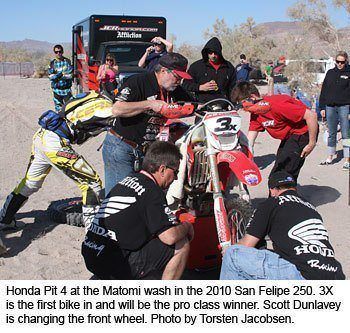 The wash is wide at this point, making it a good location for a pit stop. It's about 8 am on race day of the San Felipe 250 and JCR Honda Racing Pit 4 is here, at race-mile 146, ready and waiting for the first motorcycles to come through. The radio squawks and we learn that Jeff "Ox" Kargola has left Pit 3 on JCR's 3X bike, in the lead. Up rolls a box-van with SDR lettered on the side – that's Scott Dunlavey Racing – and out jump the experts, Dunlavey and Eric Siraton, to take charge of a critical change-over. Once Kargola arrives, teammate Colton Udall will take over and ride the last 100 miles on a new set of wheels. Finally, in the still morning air we hear the sound of a CRF450X, Ox roars in, hits the brakes and stops in a cloud of dust. The pit crew surrounds the bike, dumping gas in the rapid-fill tank and helping Dunlavey and Siraton with the wheel changes. One minute and 45 seconds later Udall charges out of the pit, roosting the crew with the fresh knobbies. We don't mind the sand in our faces – Colton looks like he's going to win this race. Dunlavey climbs back in the box-van and heads north for the finish line where he'll be present if needed, but otherwise remain behind the scene.
The wash is wide at this point, making it a good location for a pit stop. It's about 8 am on race day of the San Felipe 250 and JCR Honda Racing Pit 4 is here, at race-mile 146, ready and waiting for the first motorcycles to come through. The radio squawks and we learn that Jeff "Ox" Kargola has left Pit 3 on JCR's 3X bike, in the lead. Up rolls a box-van with SDR lettered on the side – that's Scott Dunlavey Racing – and out jump the experts, Dunlavey and Eric Siraton, to take charge of a critical change-over. Once Kargola arrives, teammate Colton Udall will take over and ride the last 100 miles on a new set of wheels. Finally, in the still morning air we hear the sound of a CRF450X, Ox roars in, hits the brakes and stops in a cloud of dust. The pit crew surrounds the bike, dumping gas in the rapid-fill tank and helping Dunlavey and Siraton with the wheel changes. One minute and 45 seconds later Udall charges out of the pit, roosting the crew with the fresh knobbies. We don't mind the sand in our faces – Colton looks like he's going to win this race. Dunlavey climbs back in the box-van and heads north for the finish line where he'll be present if needed, but otherwise remain behind the scene.
In motorcycling, Scott Dunlavey has about done it all – a racing career; building and prepping race bikes; team management; mentoring younger riders; and co-owner of Berkeley Honda Yamaha. In all of these roles he's made friends and built long-term relationships. While Scott is well known in off-road racing and has a room full of trophies, he tends to stay out of the limelight shining on the riders he supports. Telling some of Scott's story here won't change his notoriety but it will show how a life spent in motorcycling can be rewarding – and benefit others as well.
Becoming a nationally ranked AMA pro racer was not the result of a long-range plan, it just happened.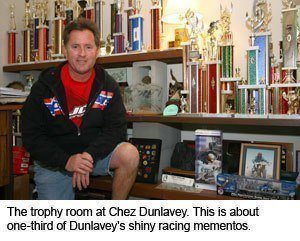 Starting out in the Moraga hills with a mini dirtbike at age 12, Scott and friends just had fun riding. A part-time job at a Bultaco shop in San Luis Obispo didn't just keep young Dunlavey in change while going to college, it fed his desire to compete in flat track – his specialty – and exposed him to trials competition as well. As the junior member of a four-man team competing in the Trial de Espana in Southern California, Scott won probably the most costly trophy of his career. He was the novice member and rode just well enough that the team still won. The expense came after the podium when he took the trials bike on a short track course and raced it just to see how it handled in the dirt, seizing the piston in the process. "That was a $200 cylinder back then," recalls Scott, "and I didn't have any money. It was just a stupid kid thing to do, but that trophy ended up costing me two hundred bucks."
Starting out in the Moraga hills with a mini dirtbike at age 12, Scott and friends just had fun riding. A part-time job at a Bultaco shop in San Luis Obispo didn't just keep young Dunlavey in change while going to college, it fed his desire to compete in flat track – his specialty – and exposed him to trials competition as well. As the junior member of a four-man team competing in the Trial de Espana in Southern California, Scott won probably the most costly trophy of his career. He was the novice member and rode just well enough that the team still won. The expense came after the podium when he took the trials bike on a short track course and raced it just to see how it handled in the dirt, seizing the piston in the process. "That was a $200 cylinder back then," recalls Scott, "and I didn't have any money. It was just a stupid kid thing to do, but that trophy ended up costing me two hundred bucks."
After college Dunlavey took racing to the next step and rose rather quickly up the AMA ranks to earn a national plate among the top 100 pro riders. Supported by local sponsors, he teamed with Frank Diaz from Richmond and rode the pro circuit from 1983-87. Scott raced and Frank was the mechanic. If this sounds like something straight out of "On Any Sunday" it was, with one slight difference. Mert Lawwill was fighting to keep his number 1 plate – Scott was ranked 96th.
Scott began racing Pikes Peak when motorcycles were re-introduced in 1990. He had a rivalry with Eddie Mulder, who'd introduced the twins class to Pikes Peak as a way to race their old dirt track machines. "I freshened up a 750 Yamaha and Eddie, who was about fifteen years older than me, had this rocket-ship Triumph. When we came off the line, he hole-shotted me," said Dunlavey, "and I remember being intimidated to pass him. Finally, after three or four corners, I said to myself, 'let's get the old boy out if the way' and I passed him. And beat him." Scott remembers that Mulder, who was a hero to Scott as a kid, "was pretty grumpy for about an hour, but then we both laughed about it." Scott has won motorcycle classes at Pikes Peaks five times and was the Grand Marshall for the event the past two years.
The most memorable race was in 2001 when Dunlavey, 'Mouse' McCoy, 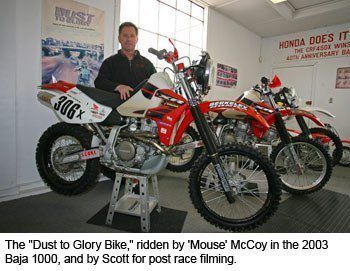 and two other teammates took third in overall time in the Baja 1000 (behind the two factory Hondas) and won Class 30, for riders thirty and over. Says Scott, "For me, winning the Baja 1000 was a dream, and, after that, everything else was like, well, whatever."
and two other teammates took third in overall time in the Baja 1000 (behind the two factory Hondas) and won Class 30, for riders thirty and over. Says Scott, "For me, winning the Baja 1000 was a dream, and, after that, everything else was like, well, whatever."
Besides winning the Baja 1000, there were a number of reasons why Dunlavey's serious racing began to wind down. "After a few years in the nationals, I calculated that spending $50,000 to make $30,000 was not the way to move forward in life," he remembers. Another was the realization that "the return throttle cable was being stretched more than the pull cable… that I really didn't want to go over those blind rises wide-open in high gear anymore." Likely the biggest reason was the arrival of daughter Alexia, born to Juliana and Scott a few days before the 2003 Baja 1000 and the filming of "Dust to Glory." Heavily involved in preparing for this race and the movie-making, he did just about everything except race. Scott puts this transition in stark terms: "It was a hard thing to do, ego-wise. But the racing edge was gone," and then he added, "There's a bigger picture. I was the past. Alexia is the future." 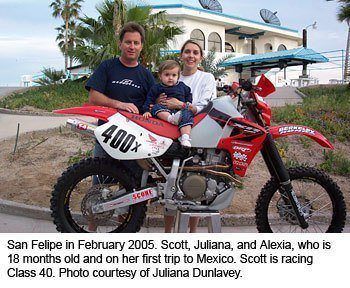 The transition from racer to bike builder and manager was nearly complete.
The transition from racer to bike builder and manager was nearly complete.
In 2004 Dunlavey got a call from Bruce Ogilvie, Honda's off-road racing manager, to build a set of Honda 650's for the Best of the Desert series. The Honda team won big that year and afterward. This involvement with Honda Racing deepened in successive years, particularly when Ogilvie – by now Scott's close friend – developed cancer and had to rely to an ever-greater extent on Scott. After his death last April, Ogilvie's mantle was passed formally to Johnny Campbell (multi-winner of the Baja 1000). In practice, the tasks of team management fell to both Johnny and Scott. It took a few months for things to settle down, for the new team and the veterans of the Ogilvie era to meld, but now JCR-Honda Racing is not only a winning team, it runs as smoothly and effectively as ever.
A member of the JCR team, pro-rider Tim Weigand was selected for USA trophy team in the 2009 ISDE (International Six Days Enduro), in Portugal. Each rider has a single person who acts as mechanic, helper, and 'general manager' during the six days, and Weigand asked Scott to accompany him. "It was a lot more work than I thought," says Scott, "You work from sun-up to sundown for two weeks. You prep not only the bike, you prep the rider. There's no radio communication, so you've got to think ahead what he's going to need at three different stops during the day, and have it there. Make sure he eats good, hydrates. Get his little butt to bed. Then get him up in the morning and back on the bike." Sounds doable, but it got really tricky when Weigand contracted food poisoning after the third day and "basically wall-papered the hotel room from both ends." After a visit to the doctor, a stomach-cramped Weigand was persuaded to keep going on the fourth day. But then early that morning he crashed and tore off a fingernail. At this point, he'd had enough: "I quit. I quit. I quit," Scott recalls him saying. Now the personal assistant had to assume the roles of father-figure, psychologist, and whip, mixing them in just the right proportions that Tim Weigand could pick himself up and soldier on to the finish. Weigand took home a gold medal.
Scott not only enjoys the role of mentor, he takes it very seriously.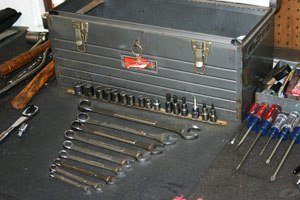 "Timmy's the next generation," says Scott, "he's just over thirty, but still twenty years younger than I am. I use my experience to help him achieve his goals, and I hope he'll be lucky enough when he's my age to have the same opportunity to help the generation after him." For more on Scott's generosity, see David Lander's sidebar story of how Scott inspired a UC Berkeley engineering student and neophyte racer.
"Timmy's the next generation," says Scott, "he's just over thirty, but still twenty years younger than I am. I use my experience to help him achieve his goals, and I hope he'll be lucky enough when he's my age to have the same opportunity to help the generation after him." For more on Scott's generosity, see David Lander's sidebar story of how Scott inspired a UC Berkeley engineering student and neophyte racer.
Around the same time it dawned on Scott that his future might not be as a professional dirt-track racer, he also realized he loved the motorcycle business. He went to work for Berkeley Yamaha, then located on the corner of University and California. Once the inventory glut from the early 1980's had been sold, life in the industry was good and, in 1987, Berkeley Yamaha bought "The Homestretch," a horse-parlor bar at 4th and Gilman and converted it to the facility you see there today. With this move, Scott also became a partner. Over the next ten years, one other partner left, the Honda dealership was added, and now Scott and Karl Triest are co-owners of Berkeley Honda Yamaha.
Enter the store and you'll nearly always find Karl at the service desk, and Scott either counseling customers or back in the shop, prepping bikes for the next desert race. Juliana works at the store too, but in recent years has cut back to have more time at home. The shop alone is worth a visit, if only to admire its immaculate appearance. The hardwood dance floor of the Homestretch survives in the workshop, but it's cleaner now than it ever was. Just check out the end wrenches lying on the bench next to Scott's tool box – each wrench in its proper place, not a hair's breadth out of position. This is not quite OCD, but it is pure Dunlavey, who explains it this way. "OK, I'm a clean-freak. If it's a mess, I can't find it. If it's clean, I know where it is."
But in the final analysis, it's not motors, tires, tools or trophies that count – it's the friendships you make. No one realizes this better than Scott, who says, "The motorcycle business has been good to me. It's the people. People buy motorcycles from people, not from stores."
In 1984 Bob Stokstad bought a brand new Yamaha FJ 600 "from Scott," even though Scott was just the parts man back then. Over the years he bought a few more bikes. But that wasn't his only, or even the main, connection. Stopping by the store to chat with Scott – and pick up a copy of CityBike – had become habit. Scott had become a friend.
Soon the box-van will be back again from Baja and the Tecate 500 - where the incredibly successful JCR Racing teams took both first place and second place. It will be time to stop by the store, say hello to Scott and get the inside story on the race.